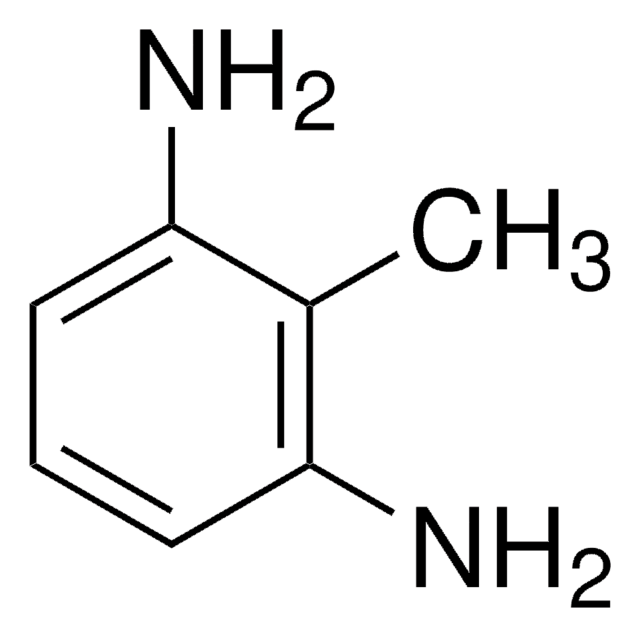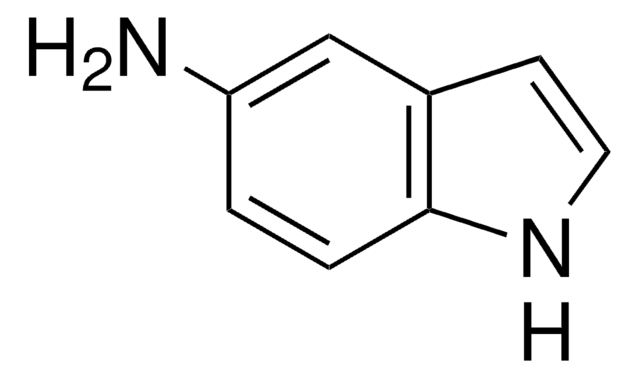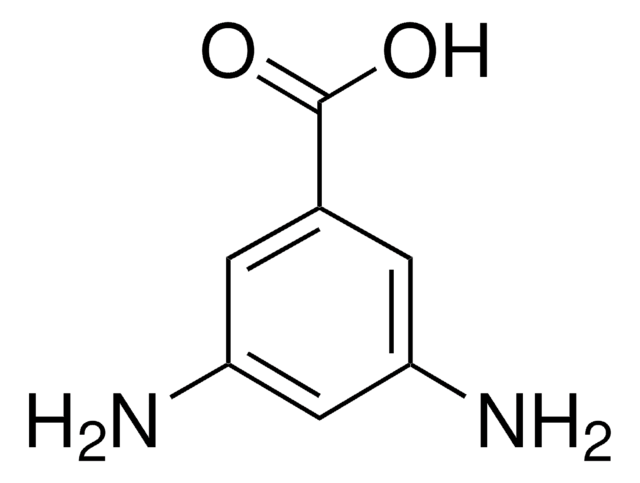推荐产品
化驗
97%
形狀
solid
mp
104-106 °C (lit.)
SMILES 字串
Cc1c(N)cccc1N
InChI
1S/C7H10N2/c1-5-6(8)3-2-4-7(5)9/h2-4H,8-9H2,1H3
InChI 密鑰
RLYCRLGLCUXUPO-UHFFFAOYSA-N
訊號詞
Warning
危險分類
Acute Tox. 4 Dermal - Acute Tox. 4 Oral - Aquatic Chronic 2 - Muta. 2 - Skin Sens. 1
儲存類別代碼
11 - Combustible Solids
水污染物質分類(WGK)
WGK 3
閃點(°F)
Not applicable
閃點(°C)
Not applicable
個人防護裝備
dust mask type N95 (US), Eyeshields, Faceshields, Gloves
其他客户在看
P Lind et al.
The Analyst, 122(1), 51-56 (1997-01-01)
Blood and urine samples were collected from six workers and two volunteers exposed to thermal degradation products from toluene diisocyanate (TDI)-based polyurethane (PUR) before and during the summer vacation. Air samples were collected on filters impregnated with 9-(N-methylaminomethyl)anthracene. The concentrations
Diaminotoluenes induce intrachromosomal recombination and free radicals in Saccharomyces cerevisiae.
R J Brennan et al.
Mutation research, 381(2), 251-258 (1998-01-22)
The carcinogenicity of aniline-based aromatic amines is poorly reflected by their activity in short-term mutagenicity assays such as the Salmonella typhimurium reverse mutation (Ames) assay. More information about the mechanism of action of such carcinogens is needed. Here we report
M L Cunningham et al.
Environmental health perspectives, 104 Suppl 3, 683-686 (1996-05-01)
The aromatic amines 2,4-diaminotoluene (2,4-DAT) and 2,6-diaminotoluene (2,6-DAT) are structural isomers that have been extensively studied for their mutagenic and carcinogenic characteristics. Both compounds are rapidly absorbed after oral administration and are equally mutagenic in the Ames test; however, 2,4-DAT
M Taningher et al.
Toxicology, 99(1-2), 1-10 (1995-05-05)
Among aminoaromatics, 2,4-diaminotoluene (2,4-DAT) and 2,6-diaminotoluene (2,6-DAT) represent a conflicting couple of isomers; despite showing the same structural alert to DNA reactivity (and thus potential genotoxicity), they are different in terms of carcinogenicity. Of the two, 2,4-DAT alone is a
B M Miller et al.
Environmental and molecular mutagenesis, 26(3), 240-247 (1995-01-01)
A rapid and simple procedure for the micronucleus test (MNT) in vitro using Chinese hamster ovary (CHO) cells was established in our laboratory. The assay is intended to quickly screen chromosomal aberrations in vitro within the framework of industrial genotoxicity
我们的科学家团队拥有各种研究领域经验,包括生命科学、材料科学、化学合成、色谱、分析及许多其他领域.
联系技术服务部门














